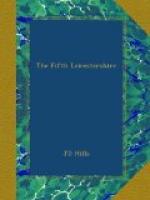On the 2nd September we were relieved by the Lincolnshires again, and once more became Brigade reserve for six days—six of the most unpleasant days we spent in the Salient. First the Railway dug-outs, to which Battalion Headquarters and half the Battalion should have gone, had been so badly shelled while the Lincolnshires were there that only one company was allowed to go, while the remainder were sent to bivouac at Kruisstraat. The fine weather came to an end the same day, and it rained hard all the time, which would have been bad enough in bivouacs, and was worse for us who had to spend most of our day on some working-party, either dug-outs, or trying to drain some hopelessly water-logged communication trench, such as the one from Manor Farm to Square Wood. Altogether we had a poor time, and were quite glad on the 8th to return to trenches, where we were joined two days later by Lieut.-Col. C.H. Jones, who had returned from England and took over command. He had had the greatest difficulty in returning to France, and it was only when he had applied to the War Office for command of a Brigade in Gallipoli that the authorities at last took notice of him and sent him back to us. On his arrival Major Toller resumed his duties of 2nd in command; Major Bland was at the time in England sick.
The arrival of an officer reinforcement was always the signal for a Boche strafe, and the return of the Colonel they celebrated with a two days’ “hate” instead of one. “A1” and “50” and their supports suffered most, and much damage to trenches was done by heavy Minenwerfer, 8” and 5.9” shells. Towards evening the situation became quieter, but just before 10 o’clock the Boche exploded a camouflet against one of our “A1” mine galleries, and killed three Tunnellers, whose bodies we could not rescue owing to the gasses in the mine, which remained there for more than twenty-four hours. The next day the bombardment of “50” and “50S” continued, and amongst other casualties, which were heavy, Capt. J.L. Griffiths and 2nd Lieut. R.B. Farrer of “B” Company were both hit and had to be evacuated, the one with 13, the other 35 small fragments of shell in him. The enemy had now become so persistent that we asked for help from our heavy artillery, and the following day—our last in the line—we carried out several organized bombardments of important enemy centres, such as “Hill 60,” to which he replied with a few more large “crumps” on “50” support and was then silent. In the evening the Lincolnshires took our place, and, having lost 11 killed and 39 wounded in 6 days, we marched back to rest at Dickebusch huts.




